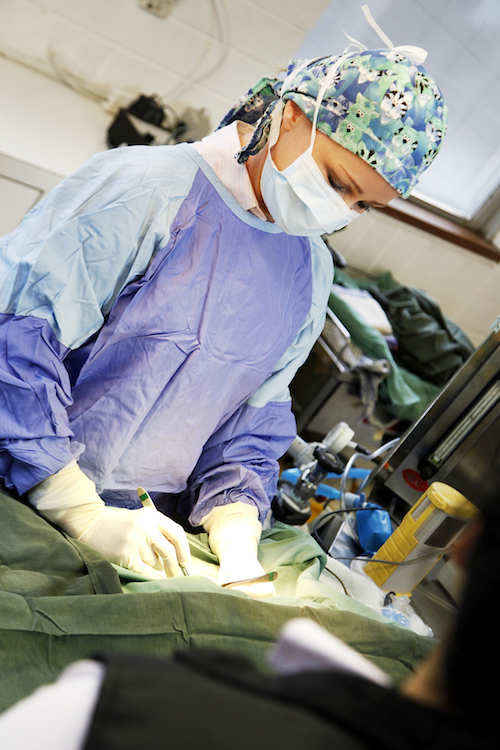Desexing
Desexing
Malvern Vet Hospital offers desexing for dogs and cats of both sexes.
In dogs, there has been significant research done on the impact of desexing at different ages and different breeds. In some breeds there is a correlation between the age of desexing and the incidence of subsequent joint disorders, cancers and urinary incontinence. For a specific medical recommendation on what is the ideal age to desex your dog please contact us at askthevet@malvernvet.com.au and advise us of your dogs age and breed (or mix of breeds if known) and we will get back to you with a recommendation of what age is best to desex.
Cats should be spayed or castrated at 6 months of age (as recommended by the AVA – Australian Veterinary Association). At this age, the animals are old enough for an anaesthetic but still have immature reproductive tracts – ensuring a safer surgery.
The pet needs to be kept rested for the next 7- 10 days (no walks) and intradermal sutures are used which are dissolvable with no ties visible for pets to pull at and no need to be removed.
Pre anaesthetic screening :
Recommended even in young animals as it can be used to establish a normal baseline and can help uncover congenital abnormalities. Used to assess the function of your pets’ kidneys and liver as they are the organ responsible for filtering the medications used. If there is some disease there already an anaesthetic can compromise these organs further and potentially push them into renal failure. If you pet is found to have some renal disease we may alter the medications used or adjust our procedure plan. The blood test also checks your pets red and white blood cells for signs of infection or clotting deficiencies which again can alter the our procedure plan. Strongly recommended in cats and dogs over 7 years of age. The blood test will be done on the morning of the procedure prior to any medications being given.
Brachycephalic breeds:
Short nosed breeds (brachycephalics), such as Pugs/ French bulldogs, have a higher risk of regurgitating while under anaesthetic, as a result of their altered anatomy. While under anaesthesia, regurgitation can lead to burning the lining of the oesophagus. Inhalation of the regurgitated contents may also cause aspiration pneumonia (infection in the lungs). To avoid this happening and to improve your pets safety during a general anaesthesia, we recommend using medication to prevent vomiting, as well as antacids, before and after the procedure. Please speak to a veterinarian in order to determine if this precaution is necessary for your dog.

The Desexing Procedure
In the desexing procedure, your animal will either be castrated or spayed. Females have a small incision in the mid belly area and have the uterus and ovaries removed. Males have the testicles removed via a skin incision just above the scrotal sac. All pets receive pain relief medication.
Highest Safety Precautions
As Malvern Vet Hospital is as an accredited veterinary clinic, we are able to boast an extremely high safety record because of the numerous safety protocols in place, such as:
- Pre-operative Opiate pain relief to ensure your pet is calm and comfortable – STANDARD care
- PLUS: Medication that stops pain at the level of the brain – STANDARD care
- PLUS: NSAID pain relief – STANDARD care
- PLUS: Take home NSAID pain relief – STANDARD care
- Heated operating table – STANDARD care
- Heated recovery cages- STANDARD care
- IV fluids during GA- STANDARD care (* cat castrations excepted- IV port placement STANDARD care)
- Onsite Pre-anaesthetic screening including comprehensive biochemistry panel AND comprehensive haematology panel – OPTIONAL care
- Multi-parameter anaesthetic monitoring throughout the anaesthesia including SPO2, heart rate, Blood pressure (MAP, SP & DP), temperature- STANDARD care
- Separate operating theatre with strict sterility protocols- STANDARD care
- Qualified theatre nurses trained in anaesthesiology monitoring each patient – STANDARD care
- Intradermal sutures used where possible (most cases) to reduce discomfort caused by sutures and reduce risk of post operative infection caused by licking/ rubbing the surgical wound. This also means you won’t have to return to have sutures removed because they are not visible- they are within the dermis of the skin and they dissolve.
- High risk patient protocols (eg Brachycephalic protocols)
Reasons for desexing your animal
There are many reasons to have your animal desexed, but some of the common reasons include:
- to avoid common medical conditions such as mammary or testicular tumors, pyometra, prostate disease, unwanted pregnancy and urine spraying in cats.
- to reduce the likelihood of roaming (runaways), being hit by cars and dog/cat fight injuries
- to reduce council registration fees
For further information on dog desexing, cat desexing, cat boarding, vaccinations or other services contact Malvern Vet Hospital today.
